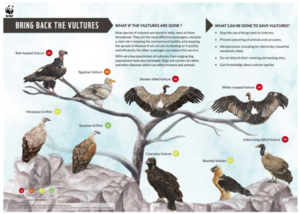Context:
Researchers have recorded the first instance of captive breeding of the Himalayan vulture (Gyps himalayensis) in India at the Assam State Zoo.
About Vultures:

- Vultures are sociable creatures and are often seen as a collective unit. Out of 23 species of vultures in the world, nine are found in India.
- Vultures are slow breeders and so the survival of every individual is very crucial.
- Generally, vultures rely on other carnivores to open carcasses.
- Vultures have a highly acidic stomach that helps them digest rotting carcasses and kill disease-causing bacteria.
- Indian Vulture or Long-billed vulture (Gyps indicus): Critically Endangered
- Indian White-backed Vulture (Gyps bengalensis): Critically Endangered
- Red-headed Vulture (Sarcogypscalvus): Critically Endangered
- Slender-billed Vulture (Gyps tenuirostris): Critically Endangered
- Egyptian Vulture (Neophronpercnopterus): Endangered
- Cincerous Vulture (Aegypiusmonachus): Near Threatened
- Bearded Vulture (Gypaetusbarbatus): Near Threatened
- Himalayan Vulture (Gyps himalayansis): Near Threatened
- Griffon Vulture (Gyps fulvus): Least Concern
- CITES: Appendix II
- Wildlife Protection Act, 1972: Schedule I

Image Credit: WWF
Factors responsible for decline in future population- Use of diclofenac: It relieves cattle of pain, but is toxic to vultures even in small doses and causes kidney failure and death.
- Hunting: Myths about the medicinal healing powers of vultures’ body parts have led to the hunting of vultures.
- Quarrying: Quarrying and blasting of stones where vultures nest have also caused their decline.
- Captive Breeding Centres: Union government in collaboration with the forest departments and the Bombay Natural History Society has established the captive breading centre in Haryana, Assam, Madhya Pradesh and West Bengal.
- Vulture Restaurants: vulture restaurants was created in certain of Maharashtra where carcasses free of diclofenac are provided.
- National Board for Wildlife (NBWL) has approved an Action Plan for Vulture Conservation 2020-25: Key Highlights
- Ban on Toxic Drugs: The Drugs Controller General of India will ban drugs, including diclofenac, that are used to treat cattle and known to poison vultures.
- Vulture Safe Zone: At least one “Vulture Safe Zone” in every State for the conservation of the remnant populations
- Establishment Vulture Conservation Breeding Centres: Vulture Conservation Breeding Centres will be set up in Uttar Pradesh, Tripura, Maharashtra, Karnataka and Tamil Nadu.
Post Views: 160
